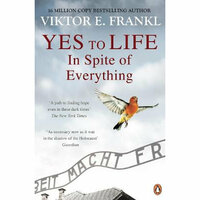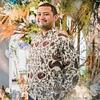Take a photo of a barcode or cover
"[T]he individual, and only that individual, determines whether their suffering is meaningful or not." (100)
3 stars. It's overly simplistic to call this a draft of Frankl's better-known work because there is some new content to find here. But I do think it's best read as a supplement to Man's Search for Meaning. A bit more time is spent on the underlying reasoning that led towards Frankl's major assertions in Man's Search which is interesting but Man's Search is much more refined, so I feel everybody ought to start there for the fullest effect. Plus the fore- and afterwords are repetitive, largely rehashing the content of the lectures themselves.
3 stars. It's overly simplistic to call this a draft of Frankl's better-known work because there is some new content to find here. But I do think it's best read as a supplement to Man's Search for Meaning. A bit more time is spent on the underlying reasoning that led towards Frankl's major assertions in Man's Search which is interesting but Man's Search is much more refined, so I feel everybody ought to start there for the fullest effect. Plus the fore- and afterwords are repetitive, largely rehashing the content of the lectures themselves.
hopeful
inspiring
reflective
medium-paced
I had earlier tried reading Viktor Frankl's Man's Search For Meaning but found it quite hard going and gave up midway. (Update: I later realised I'd meant to borrow Man's Search for Meaning from the library but picked up Man's Search for Ultimate Meaning instead, which is a completely different book by Frankl! The former is much more accessibly written). But his name came up so many times - in thoughtful articles and essays, in conversations with people - that I felt I had to give it another go. I figured I would ease myself back into Man's Search for Meaning by starting with Yes to Life: In Spite of Everything, the basis of which were the lectures Frankl gave just 11 months after being released from a Nazi labour camp.
It was a good call. Yes to Life is a powerful book and much more accessibly written (to me at least). The premise to Yes to Life is that whatever the circumstances, individuals always have agency and choice to determine how they respond to these circumstances. Retaining that sense of agency and control brings dignity and gives life meaning.
Frankl sets his audience straight that life is not about the pursuit of happiness . Rather, "life is somehow duty, a single, huge obligation. And there is certainly joy in life too, but it cannot be pursued, cannot be 'willed into being' as joy". Rather, joy is a spontaneous and incidental outcome when one fulfils one's duties in life. JKF told Americans to ask not what their country can do for you, but what you can do for your country. Frankl tells us that the question is not "what can I expect from life" but "what does life expect of me? What task in life is waiting for me?". And what life expects of us, what task lies before us, changes from moment to moment for each individual. At every moment, we can choose how we respond, how we "fill [our] place, [our] circle".
Meaning in life can also come from loving - how we experience other human beings and how we respond to experiences whether in the natural world or created by humans (e.g. the arts). Finally, Frankl argues that we also give life meaning through suffering. This circles back to his point that we exercise agency in deciding how we adapt, respond and react to our fate, to the "unavoidable limitation of [our] possibilities" and it is this agency that gives our life meaning and dignity. This is how, even as a prisoner in a concentration camp, where prisoners were told that they were "not worth the soup" they were fed once a day, and where the Nazis tried to exploit what little capacity for labour was left in the prisoners, Frankl managed to maintain his sense of purpose, dignity and sanity.
There were a couple of mind-blowing moments in the book where Frankl shifts the frame on issues. Like when he argues why it is death that allows our lives to have meaning and purpose:
"if we were immortal, then we could postpone everything…Because it would never matter whether we did a particular thing right now, or tomorrow, or the day after, or in a year, or in ten years, or whenever. No death, no end would be looming over us, there would be no limitation of our possibilities, we would see no reason to do a particular thing right now, or surrender ourselves to an experience just now - there would be time, we would have time, an infinite amount of time.
Conversely, the fact, and only the fact, that we are mortal, that our lives are finite, that our time is restricted and our possibilities are limited, this fact is what makes it meaningful to do something, to exploit a possibility and make it become a reality, to fulfil it, to use our time and occupy it….death forms the background against which our act of being becomes a responsibility.
…We do not judge the life history of a particular person by the number of pages in the book that portrays it but only by the richness of the content it contains."
Or when he argues that it is our imperfections that give us value: "the imperfect nature of human beings is meaningful since - now regarded positively - it represents the individuality of our essential inner being".
Yes to Life stresses that a meaningful life is not about external successes although those may be pleasant things to have. It is about our "inner success" - our attitudes and stance towards our circumstances and how these shape our actions and reactions. It calls on the audience to be more intentional about how we live and experience each moment, for "in every moment I can actualise the possibility of a moment, of that particular moment, or forfeit it". It calls for us to think about how we occupy the circles in which we exist, the value we bring to our communities.
This call to action is not one borne of optimism. In the aftermath of WWII, Frankl argues that a different kind of activism must emerge, one that "requires pessimism…we are still only able to seize the opportunities in life from a standpoint of skepticism, while the old optimism would just lull us into complacency and induce fatalism, albeit a rosy fatalism".
Yes to Life as a title may sound like a joyous and uplifting call to embrace life. Shades of YOLO. It is not, as evidenced by the second half of the title "in spite of everything". Rather, Frankl urges us to accept that meaning and purpose can be found in life's trials and tribulations; while these difficulties may not bring us happiness as we think of the term, it can bring joy from living with intentionality and dignity.
It was a good call. Yes to Life is a powerful book and much more accessibly written (to me at least). The premise to Yes to Life is that whatever the circumstances, individuals always have agency and choice to determine how they respond to these circumstances. Retaining that sense of agency and control brings dignity and gives life meaning.
Frankl sets his audience straight that life is not about the pursuit of happiness . Rather, "life is somehow duty, a single, huge obligation. And there is certainly joy in life too, but it cannot be pursued, cannot be 'willed into being' as joy". Rather, joy is a spontaneous and incidental outcome when one fulfils one's duties in life. JKF told Americans to ask not what their country can do for you, but what you can do for your country. Frankl tells us that the question is not "what can I expect from life" but "what does life expect of me? What task in life is waiting for me?". And what life expects of us, what task lies before us, changes from moment to moment for each individual. At every moment, we can choose how we respond, how we "fill [our] place, [our] circle".
Meaning in life can also come from loving - how we experience other human beings and how we respond to experiences whether in the natural world or created by humans (e.g. the arts). Finally, Frankl argues that we also give life meaning through suffering. This circles back to his point that we exercise agency in deciding how we adapt, respond and react to our fate, to the "unavoidable limitation of [our] possibilities" and it is this agency that gives our life meaning and dignity. This is how, even as a prisoner in a concentration camp, where prisoners were told that they were "not worth the soup" they were fed once a day, and where the Nazis tried to exploit what little capacity for labour was left in the prisoners, Frankl managed to maintain his sense of purpose, dignity and sanity.
There were a couple of mind-blowing moments in the book where Frankl shifts the frame on issues. Like when he argues why it is death that allows our lives to have meaning and purpose:
"if we were immortal, then we could postpone everything…Because it would never matter whether we did a particular thing right now, or tomorrow, or the day after, or in a year, or in ten years, or whenever. No death, no end would be looming over us, there would be no limitation of our possibilities, we would see no reason to do a particular thing right now, or surrender ourselves to an experience just now - there would be time, we would have time, an infinite amount of time.
Conversely, the fact, and only the fact, that we are mortal, that our lives are finite, that our time is restricted and our possibilities are limited, this fact is what makes it meaningful to do something, to exploit a possibility and make it become a reality, to fulfil it, to use our time and occupy it….death forms the background against which our act of being becomes a responsibility.
…We do not judge the life history of a particular person by the number of pages in the book that portrays it but only by the richness of the content it contains."
Or when he argues that it is our imperfections that give us value: "the imperfect nature of human beings is meaningful since - now regarded positively - it represents the individuality of our essential inner being".
Yes to Life stresses that a meaningful life is not about external successes although those may be pleasant things to have. It is about our "inner success" - our attitudes and stance towards our circumstances and how these shape our actions and reactions. It calls on the audience to be more intentional about how we live and experience each moment, for "in every moment I can actualise the possibility of a moment, of that particular moment, or forfeit it". It calls for us to think about how we occupy the circles in which we exist, the value we bring to our communities.
This call to action is not one borne of optimism. In the aftermath of WWII, Frankl argues that a different kind of activism must emerge, one that "requires pessimism…we are still only able to seize the opportunities in life from a standpoint of skepticism, while the old optimism would just lull us into complacency and induce fatalism, albeit a rosy fatalism".
Yes to Life as a title may sound like a joyous and uplifting call to embrace life. Shades of YOLO. It is not, as evidenced by the second half of the title "in spite of everything". Rather, Frankl urges us to accept that meaning and purpose can be found in life's trials and tribulations; while these difficulties may not bring us happiness as we think of the term, it can bring joy from living with intentionality and dignity.
Ļoti vērtīga un interesanta grāmata, kas ne tikai iedos papildus kontekstu par dzīvi koncentrācijas nometnē, bet arī sniegs ieskatu par tādiem jēdzieniem kā “dzīves jēga” un “ciešanas”.
Viktors Frankls, vairākus gadus būdams ieslodzīts Aušvicas koncentrācijas nometnē, pētīja gan savas, gan apkārtējo reakcijas uz notiekošo.
Grāmatai ir divas daļas. Pirmā sadalīta trīs apakšnodaļās jeb fāzēs, kas izstāsta par ierašanos nometnē, tur pavadīto laiku un dzīvi pēc atbrīvošanas. Autors aprakstot notikumu gaitu tos analizē no psiholoģijas viedokļa - kādas izjūtas pieredz ieslodzītie, kā sevi psiholoģiski pasargā. Viņš stāsta par krīzēm un lūzuma punktiem, kā arī par to, kas palīdz izdzīvot.
Autors ir izskristalizējis svarīgo un aiznes līdz lasītājām “ceļamaizi” no savas pieredzes un profesionālajām zināšanām, tādēļ tā būs strukturēta lasāmviela,kas attiecināma arī uz katra ikdienas dzīvi.
Kad nevari atrast dzīvei jēgu, pajautā, ko dzīve sagaida no Tevis! Šī grāmatiņa ļoti brīnišķīgi skaidro.
Das Buch ist eines der intensivsten Leseerfahrungen, die ich bisher machen durfte. Ich bin dankbar, dass es geschrieben wurde. Dankbar lesen zu dürfen und trotzdem die Gewissheit zu haben, nicht im Ansatz nachempfinden zu können, was es heißt, zu erleben, was das Schreiben dieses Buches notwendig gemacht hat.
challenging
hopeful
inspiring
reflective
sad
A lecture and conversation: Dr. Viktor Frankly says life has meaning, and is worth living always.
dark
hopeful
inspiring
It's a short and sweet book that I definitely found convincing. I kind of wish I read this a few years ago when I was contemplating suicide. I mean, I made it through ok, but perhaps this book would have increased my chance of survival a bit.
Viktor Frankl adalah raksasa di bidang kesehatan mental, seorang psikiater penemu logoterapi, psikoterapi yang menetapkan bahwa pusat dorongan motivasi kemanusiaan adalah bahwa setiap manusia akan, dan harus, mencari makna.
Mengetahui latar belakangnya sebagai penyintas Holocaust & tersiksa di kamp konsentrasi Nazi, sambil mengetahui bahwa orang2 terdekatnya dibunuh, mungkin kita bisa terkaget2 mengetahui begitu positifnya sudut pandangnya akan hidup. Bukunya, "Man's Search for Meaning", menjadi panduan bagi banyak orang yang bergumul dengan kondisi mental maupun pendamping2nya untuk terus bertahan.
Buku "Yes to Life" ini adalah kumpulan kuliahnya yang kemudian dimatangkan menjadi materi dasar buku "Man's Search for Meaning". Kuliah2 yang hadir hanya beberapa bulan setelah kejatuhan Nazi.
Bisa bayangkan seberapa positifnya dia akan hidup sampai2 dia berani & bersedia menyampaikan kuliah2 tentang makna hidup tak lama setelah penyiksaannya berhenti & dia dibebaskan dari tahanan seiring runtuhnya rezim antisemit yang merusak hidupnya & orang sekitarnya?
Pengalaman pahit & gelap (namun menguatkan hasratnya terus hidup) di kamp konsentrasi sekaligus riset pribadinya terhadap sesama tahanan dalam penderitaan mereka menjadi dasarnya untuk terus bertahan. Bahwa dalam penderitaan mereka menemukan makna, adalah kekuatan tak terbayangkan untuk terus melawan keputusasaan.
Sudut pandang ini menguatkannya untuk mengupayakan metode yang mengajak setiap manusia menemukan harapan baru. Bahwa makna hidup itu selalu ada, & pantas dicari.
Dalam beberapa bagian di kuliahnya, ada kalimat2 cukup keras yang dia pakai dalam pendekatannya mencegah bunuh diri klien2nya. Kenyataannya, angka percobaan bunuh diri menurun banyak ketika dia terus menerapkan prinsip2 logoterapi pada pasiennya.
Pengalamannya jatuh & bangkit menolong kita pula untuk menggumuli apa maknanya terus berkata "ya" pada kehidupan, seberapa pun beratnya. Mencari makna, karena itu, menjadi pekerjaan rumah bersama umat manusia. Upayakan & kita akan bisa menolong satu sama lain terus bertahan dalam dunia kapitalisme zaman lanjut yang memuakkan ini.
Mengetahui latar belakangnya sebagai penyintas Holocaust & tersiksa di kamp konsentrasi Nazi, sambil mengetahui bahwa orang2 terdekatnya dibunuh, mungkin kita bisa terkaget2 mengetahui begitu positifnya sudut pandangnya akan hidup. Bukunya, "Man's Search for Meaning", menjadi panduan bagi banyak orang yang bergumul dengan kondisi mental maupun pendamping2nya untuk terus bertahan.
Buku "Yes to Life" ini adalah kumpulan kuliahnya yang kemudian dimatangkan menjadi materi dasar buku "Man's Search for Meaning". Kuliah2 yang hadir hanya beberapa bulan setelah kejatuhan Nazi.
Bisa bayangkan seberapa positifnya dia akan hidup sampai2 dia berani & bersedia menyampaikan kuliah2 tentang makna hidup tak lama setelah penyiksaannya berhenti & dia dibebaskan dari tahanan seiring runtuhnya rezim antisemit yang merusak hidupnya & orang sekitarnya?
Pengalaman pahit & gelap (namun menguatkan hasratnya terus hidup) di kamp konsentrasi sekaligus riset pribadinya terhadap sesama tahanan dalam penderitaan mereka menjadi dasarnya untuk terus bertahan. Bahwa dalam penderitaan mereka menemukan makna, adalah kekuatan tak terbayangkan untuk terus melawan keputusasaan.
Sudut pandang ini menguatkannya untuk mengupayakan metode yang mengajak setiap manusia menemukan harapan baru. Bahwa makna hidup itu selalu ada, & pantas dicari.
Dalam beberapa bagian di kuliahnya, ada kalimat2 cukup keras yang dia pakai dalam pendekatannya mencegah bunuh diri klien2nya. Kenyataannya, angka percobaan bunuh diri menurun banyak ketika dia terus menerapkan prinsip2 logoterapi pada pasiennya.
Pengalamannya jatuh & bangkit menolong kita pula untuk menggumuli apa maknanya terus berkata "ya" pada kehidupan, seberapa pun beratnya. Mencari makna, karena itu, menjadi pekerjaan rumah bersama umat manusia. Upayakan & kita akan bisa menolong satu sama lain terus bertahan dalam dunia kapitalisme zaman lanjut yang memuakkan ini.





